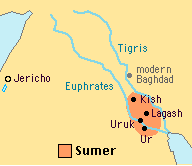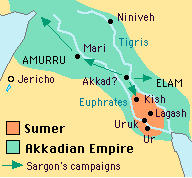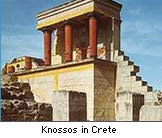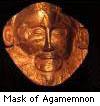King of Uruk

Many stories and myths were told about Gilgamesh, some of which were written down about 2000 B.C. in the Sumerian language on clay tablets which still survive.
These Sumerian stories were integrated into a longer poem; the fullest surviving version is derived from twelve stone tablets, in the Akkadian language, found in the ruins of the library of Ashurbanipal, king of Assyria, at Nineveh.
The Epic of Gilgamesh is, perhaps, the oldest written story on Earth.
Embedded in the epic is a percursor of the biblical flood story. The narrative relates of how the Sumerian gods destroyed an ancient city in a great flood and how the wise priest Utnapishtim managed to survive by building a great ship and so acquired eternal life.
www link :
The Epic of Gilgamesh
An Outline with Bibliography and Links
Sargon I
Ruler of the
Akkadian Empire

Sargon the Great rose from obscure origins to become cupbearer to the king of Kish. Rebelling, he built the city of Akkad and proclaimed himself king. After defeating the king of Uruk, he conquered the rest of Sumer.
Sargon built a unified state but respected the traditions of the conquered peoples, especially the culture of the Sumer.
He conquered Upper Mesopotamia and the Amorites in Syria, and created an empire that ranged from the Persian Gulf to the Mediterranean.
A later king, Naram-Sin, brought the empire of Akkad to its zenith.
He was the first Mesopotamian king to claim divinity, as well as the
first to be called 'King of the Four Quarters' (that is, of the World).
Minos
King of Crete

A legendary ruler of Crete who was believed to be the son of Zeus, the king of the gods.
According to legend Minos obtained the Cretan throne by the aid of the Greek god Poseidon, and from Knossos he gained control over the Aegean islands.
Minos warred against Athens and in Athenian drama he became the tyrannical exactor of the tribute of children to feed the Minotaur, in Greek mythology a fabulous monster of Crete, half man and half bull.
Although Athens preserved a hostile tradition, the general account shows Minos as a powerful, just ruler, very closely associated with religion and ritual.
In light of excavations in Crete, many scholars consider that Minos was a royal or dynastic title for the priestly rulers of Bronze age, or Minoan, Knossos.
www link :
Feature story: Minos
Agamemnon
King of Mycenae

Agamemnon - who was married to Clytemnestra - was the king of Mycenae, and leader of the Gk forces during the Trojan War.
During the seige of Troy, Agamemnon offended the greatest of the Greek warriors, Achilles, when he took the girl Briseis from him.
Achilles' anger with Agamemnon furnished the mainspring of the plot in the Epic Iliad. After the sack of Troy, Agamemnon acquired Cassandra, the daughter of King Priam, as his concubine, and took her home with him to Greece.
Back home he found that Aegisthus had become the lover of Clytemnestra, and the two together murdered Agamemnon and Cassandra shortly after their arrival.
Aegisthus and Clytemnestra then ruled Agamemnon's kingdom, but were eventually killed by Agamemnon's son, Orestes.
(see also Homer)
www link :